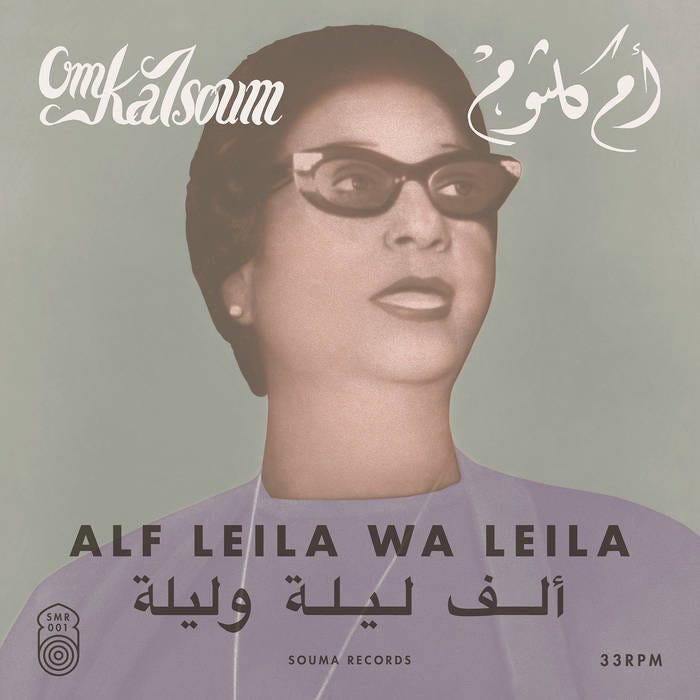Genre of the Day - Traditional Arabic Pop
Album of the Day - ألف ليلة وليلة (Alf Leila wa Leila) by Umm Kulthum (1969)
Take your favorite song at the moment—it’s probably around three to five minutes, right? Now imagine if that song was stretched out to thirty minutes, an hour, or even longer. Would its narrative still hold up? Would the vocalist be compelling enough? Would you sacrifice, say, a couple episodes of a show or an errand to listen to it? This was simply the reality of songcraft in traditional Arabic pop. Popular tunes were less ditties than epics, untethered by those tedious limits that whittle most other popular music to just a few minutes like 7’’ single space or radio placement.
As Arabic music transitioned to the recording era in the early 20th-century, audiences still saw the value of long performances that dug into a story with the same slowly unfolding grace of parallel musical forms like operas and ragas. Patient listeners are rewarded with tarab, a word that indicates a state of entranced ecstasy stimulated by a musical performance. Musicians captured listeners with the grandeur of string ensembles and virtuosic vocalists, while traditional instrumentation in the form of the oud and drums refused replacement by western instruments like the guitar. Popular music became a way to define nationalism in the emerging Arab nations once borders were drawn and freedom efforts brought about independence following the two World Wars. Today’s artist, for example, was a fundamental fixture in bringing forth a cultural identity of Egyptianness in conjunction with the political nationalism espoused by the most important Egyptian president of the 20th century.
The importance of vocalists tends to wax and wane in any popular music scene depending on what audiences crave at the moment, but in traditional Arabic pop of the first half of the 20th century, vocal prowess was indispensable. Many Arab countries have centuries of writing, literary, and discursive tradition sewn into their cultural fabric; discussion, argumentation, and debate inform a musical context where lyrics take precedence. Moreover, bonding over and discussing music as a common experience trumps the individual experience of listening to music: in this way, Umm Kulthum was catapulted into a national and regional stardom for which there are few true parallels. One radio station established by President Nasser opened and closed the day with a tape of her concerts, and some might go further to say that “There is not a real Egyptian who does not love Umm Kulthum.”
Umm Kulthum was a country girl born to an imam father in a town down the Nile river, north of Cairo. Her musical talent was uncontainable: she’d reportedly memorized the Quran by her teens, and her talent for words and performance was as ample as her musical ability. At the outset of her career, she sang in an astounding twenty-three maqams, melodic modes in traditional Arabic music. Different maqams evoke different sentiments for a listener; having a grasp of so many indicates the breadth of her expressive power. Her dad had no choice but to let that talent free, but it was unusual for girls to be singing at the time; he had her dress up and cover her face as she began to perform in ensembles. She headed south to the big city in 1923, meeting lyricists and musicians in Cairo who would help her ascend to the voice of Egypt and arguably the whole Arab world at the time as the legend of her performance ability spread thanks to the radio becoming firmly entrenched across Egypt by the 1960s. Today’s album, a 1969 recording of “Alf Leila wa Leila” (“One Thousand and One Nights”) is a performance from the twilight of her career, though you’d never know. Her singularly potent contralto conveys sheer strength in weaving the song’s longing tale, introduced by eight minutes of dramatic string cascades. Her voice promises tarab with every turn of phrase, and no syllable is wasted. She suffuses each cry of habibi with life-or-death urgency. Kulthum possessed musical aptitude and vocal talent that not only defined today’s genre, but an entire era of Arab life and cultural expression—four million people attended her funeral, a tangible example of how the power of an individual’s voice and its ability to cause tarab can impact millions.





Had a Lebanese friend indefinitely loan me some Umm Kulthum and Fairuz records back in the early 2000s and that opened up a whole amazing world to my ears. I can think of worse ways to spend an evening, listening to either of them, glass of wine in hand, cooking a nice meal...
"Popular tunes were less ditties than epics, untethered by those tedious limits that whittle most other popular music to just a few minutes like 7’’ single space or radio placement.....audiences still saw the value of long performances that dug into a story with the same slowly unfolding grace of parallel musical forms like operas and ragas." Love this. I am not familiar with Umm Kulthum, but I grew up around both Indian and Western classical music and as a kid I thought all music except nursery rhymes was long and epic. Today, a 6 minute prog-rock or metal song is too long for most people. Attention spans have been falling steadily for a long time, and now tiktok has led to a whole songwriting culture built around songs less than a minute long. Thanks for this column.